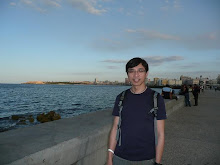In the beginning of the first Learning Session, I shared the list of potential topics with the team and got their endorsement. The list will form the backbone of future learning sessions.
- Starting Points: An Employment Trip Planner
- Framing the Face-to-Face Session: Client Engagement, SMART Goal Setting, and Crafting Career Transition
- Understanding the BC Labour Market: Selected Resources and Sector Analysis
- Resource & Information Management
- Skills Profile / Inventory
- Group Presentation and Facilitation
- English upgrading
- Standards and Guidelines for CDPs
1. Starting Points
"Starting Points" is a group assessment tool that can be used to assist clients in identifying their roadblocks(barriers) and stopovers (solutions) during their employment trip. The metaphor of the "journey" should work very well with immigrants, who are embarking on their own journeys of settling in a new country. Besides working on their roadblocks and stopovers, the clients will also review their own assets and take away with an "asset suitcase" (including skills, values, educational background, etc.) In the end, the clients will commit to an action plan that takes into account the identified roadblocks and stopovers.
The CIIP client counsellors were encouraged to consider how Starting Points could help them enhance the LMI group session.
2. Framing Face-to-Face Session
I introduced the concept of "SMART goals" (specific, measurable, attainable, relevant, time sensitive) and suggested that instead of simply conveying more information during the one-on-one session (on top of the group session), the counsellor could work with the client in determining SMART goals. Such an approach is an appropriate continuation of using Starting Points in the group session, and may enhance the existing practice of creating the IIP with the client.
In conjunction with SMART goals, I also briefly explained the practice of "active engagement", an innovative counselling approach developed by Dr. Norm Amundson (from the University of British Columbia). Goal setting is more meaningful and sustainable when the client is actively engaged in the process, instead of just relying on the counsellor to offer most of the advice. I made the point that if the client could be actively engaged from the very beginning (i.e. before the group session), the whole process could become much more collaborative.
---
References used:
Starting Points: Finding Your Route To Employment, M. Westwood, N. Amundson, W. Borgen, 1994
Bridge to Your Future, Employment Readiness Assessment Tool for Skilled Immigrants, Sheila Wallace and Associates, 2004 (http://comserv.bc.ca/bridges)
Active Engagement and the Influence of Constructivism, N. Amundson, 2004







